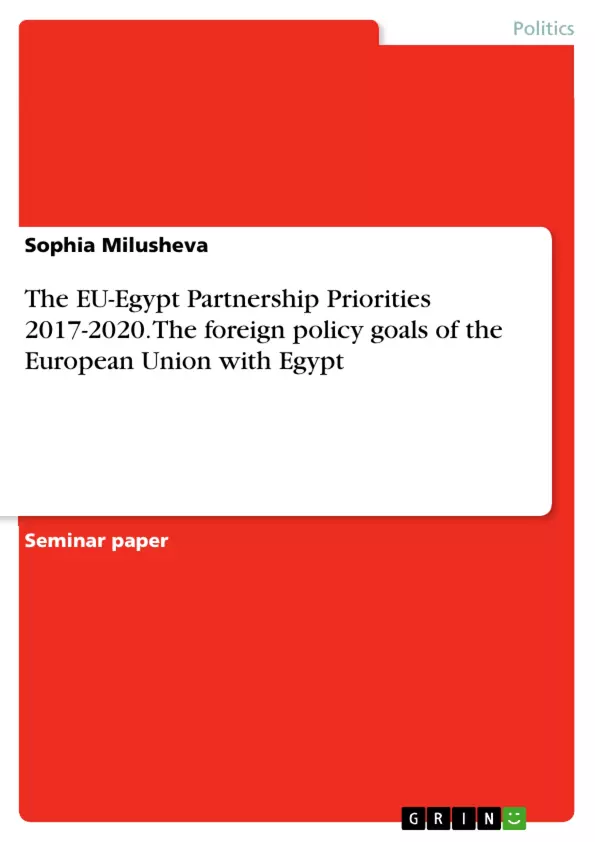The work explores the European Union (EU)-Egypt Partnership Priorities for the period 2017 until 2020. Moreover, the author tries to answer to what extent the EU has been able to attain them. The topics of a sustainable economy and social development, foreign policy of the EU and Egypt and ways to enhance stability will be discussed.
The European Neighbourhood Policy (ENP) represents the framework for EU’s strategy towards its neighbours in Eastern Europe, the Middle East, and Northern Africa. It was launched in 2004, undergoing revisions in 2011 and 2015. Its aim is to support the ENP member countries based on the principles of partnership and common interests. The ENP is financed by the European Neighbourhood Instrument (ENI) with a budget of EUR 15.4 billion for the period 2014-2020. The support primarily focuses on the promotion of human rights, the sustainability of democracy, social and economic development, mobility of people, and regional integration.
Inhaltsverzeichnis (Table of Contents)
- Introduction
- I. EU-Egypt Partnership Priorities 2017-2020
- a. Sustainable economy and social development
- b. Foreign policy
- c. Enhancing stability
- II. Current advancement of the EU-Egypt Partnership Priorities
- a. Sustainable economy and social development
- b. Foreign policy
- c. Enhancing stability
- Conclusion
Zielsetzung und Themenschwerpunkte (Objectives and Key Themes)
This study investigates the objectives of the European Union (EU) in its foreign policy towards Egypt and examines the extent to which the EU has been able to achieve these objectives. The analysis centers on the EU-Egypt Partnership Priorities for 2017-2020, focusing on the key areas of sustainable economy and social development, foreign policy, and enhancing stability.
- The EU's role in supporting Egypt's economic and social development, including its "Sustainable Development Strategy - Vision-2030"
- Cooperation between the EU and Egypt in foreign policy, including addressing regional stability and promoting human rights
- EU efforts to enhance stability in Egypt, focusing on democratic reforms, combating terrorism and extremism, and managing migration flows
- The impact of the EU's Partnership Priorities on Egypt's development and stability
- The challenges faced by the EU in achieving its objectives in its foreign policy with Egypt
Zusammenfassung der Kapitel (Chapter Summaries)
- Introduction: This section provides an overview of the European Neighborhood Policy (ENP) and its significance for the EU's relations with its neighboring countries, including Egypt. It highlights the framework for EU support through the European Neighborhood Instrument (ENI) and the importance of promoting human rights, democracy, and economic development.
- I. EU-Egypt Partnership Priorities 2017-2020: This chapter delves into the specific goals and priorities outlined in the EU-Egypt Partnership Priorities for 2017-2020, aligning with the ENP's broader objectives. It examines the three key areas of focus: sustainable economy and social development, foreign policy, and enhancing stability.
- II. Current advancement of the EU-Egypt Partnership Priorities: This section explores the progress made in implementing the Partnership Priorities up to December 2018, examining each thematic cluster in detail. It analyzes the advancements made in economic and social development, foreign policy cooperation, and stability-enhancing initiatives.
Schlüsselwörter (Keywords)
The key terms and concepts explored in this study include the European Neighborhood Policy (ENP), the European Neighborhood Instrument (ENI), the EU-Egypt Partnership Priorities 2017-2020, sustainable development, foreign policy cooperation, democratic reforms, human rights, stability, migration flows, economic development, social development, and terrorism and extremism.
Frequently Asked Questions
What are the EU-Egypt Partnership Priorities 2017-2020?
These are strategic goals focused on sustainable economic and social development, foreign policy cooperation, and enhancing stability between the EU and Egypt.
How is the European Neighbourhood Policy (ENP) financed?
The ENP is funded by the European Neighbourhood Instrument (ENI), which had a budget of EUR 15.4 billion for the 2014-2020 period.
What does "Sustainable Development Strategy - Vision 2030" refer to?
It is Egypt's national development plan which the EU supports through its partnership to promote economic growth and social welfare.
What are the main stability goals in the EU-Egypt partnership?
Key goals include combating terrorism and extremism, managing migration flows, and supporting democratic reforms and human rights.
What challenges does the EU face in its policy with Egypt?
Challenges include balancing regional stability with the promotion of human rights and democracy, as well as addressing complex migration issues.
- Citation du texte
- Sophia Milusheva (Auteur), 2019, The EU-Egypt Partnership Priorities 2017-2020. The foreign policy goals of the European Union with Egypt, Munich, GRIN Verlag, https://www.grin.com/document/508326



